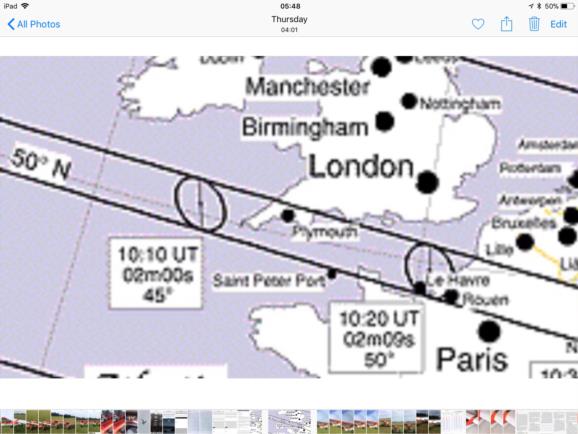
NavList:
A Community Devoted to the Preservation and Practice of Celestial Navigation and Other Methods of Traditional Wayfinding
From: Brian Walton
Date: 2019 Aug 10, 07:18 -0700
Frank et al,
You didn’t get much response to this post. It is possible to get 2 positions from an eclipse sequence using a watch. Here’s one way.
Exactly 20 years ago, on 11 Aug 99 (it’s already the 11th Aug in NZ) a total eclipse occurred in the English Channel running. essentially along the N50° parallel from the Scillies to just NE of Le Havre. The press had published the route and timings well in advance, and, crucially, had shown in chart or table form, the exact time to the second of what amateur astronomers call First, Second, Third and Fourth contact, for Plymouth, Portsmouth, and on the French side, Cherbourg and Le Havre. Second contact, the beginning of totality, and is preceded by a new moon shape, a partial solitaire ring, Bailey’ Beads, and then darkness. This can easily be seen through a piece of welder’s mask, and timed to the second. Third contact, the end of totality is the reverse.
These timings, starting at about 1010Z, formed almost vertical curves, that is longitude lines. See diagram. On an aviation chart already showing danger areas and other flight information, I plotted the timings of 2nd and 3rd contacts as they raced up the Channel from west to east, at about 20 mph, or Mach 2. Totality was due to last about 2 minutes.
On the day in question, thousands of tourists in Cornwall, and hundreds of boats in the Channel saw nothing because of an advancing weather front and scattered cloud layers. Fortunately, I was in a 2 seat Tiger Moth open biplane, and was able to get through gaps up to 10,000’ where the view was perfect. Although the sun and moon were on a bearing of 135°, and at a height of 48°, these measurements were not needed.
Longitude was given by timing 2nd and 3rd contacts to the second, and comparing the times with my chart. Latitude was given, less accurately, by:
a. Achieving totality.
b. Seeing the Bailey’s Beads enter at the 2 o’clock position, and re- emerge symmetrically at the 8 o’clock position.
c. Seeing a symmetric aurora.
d. Seeing light all around the horizon, including the northern sector, normally impossible at N50.
That is, the centreline of the eclipse path.
The view at eclipse was extraordinary. There was enough light to fly level visually, and see big analog instrument needles, but a torch was needed for the watch and chart. The aurora was white, not red, there being less refraction up there. I could see Venus and Mercury, but not Orion or Sirius. It got cold. Suddenly, a flash of light announced 3rd contact.
Because we were flying along the eclipse path at 90 mph, we got 2 mins 20 secs of totality, 12 seconds more than earthlings.
The flight lasted more than 2 hours, and needed navigation lights and a long range fuel tank, plus the usual kit. By the time we landed, cloud obscured 4th contact.
My position at 2nd contact was 1018.10”Z N50.00 W000.5
Brian Walton







